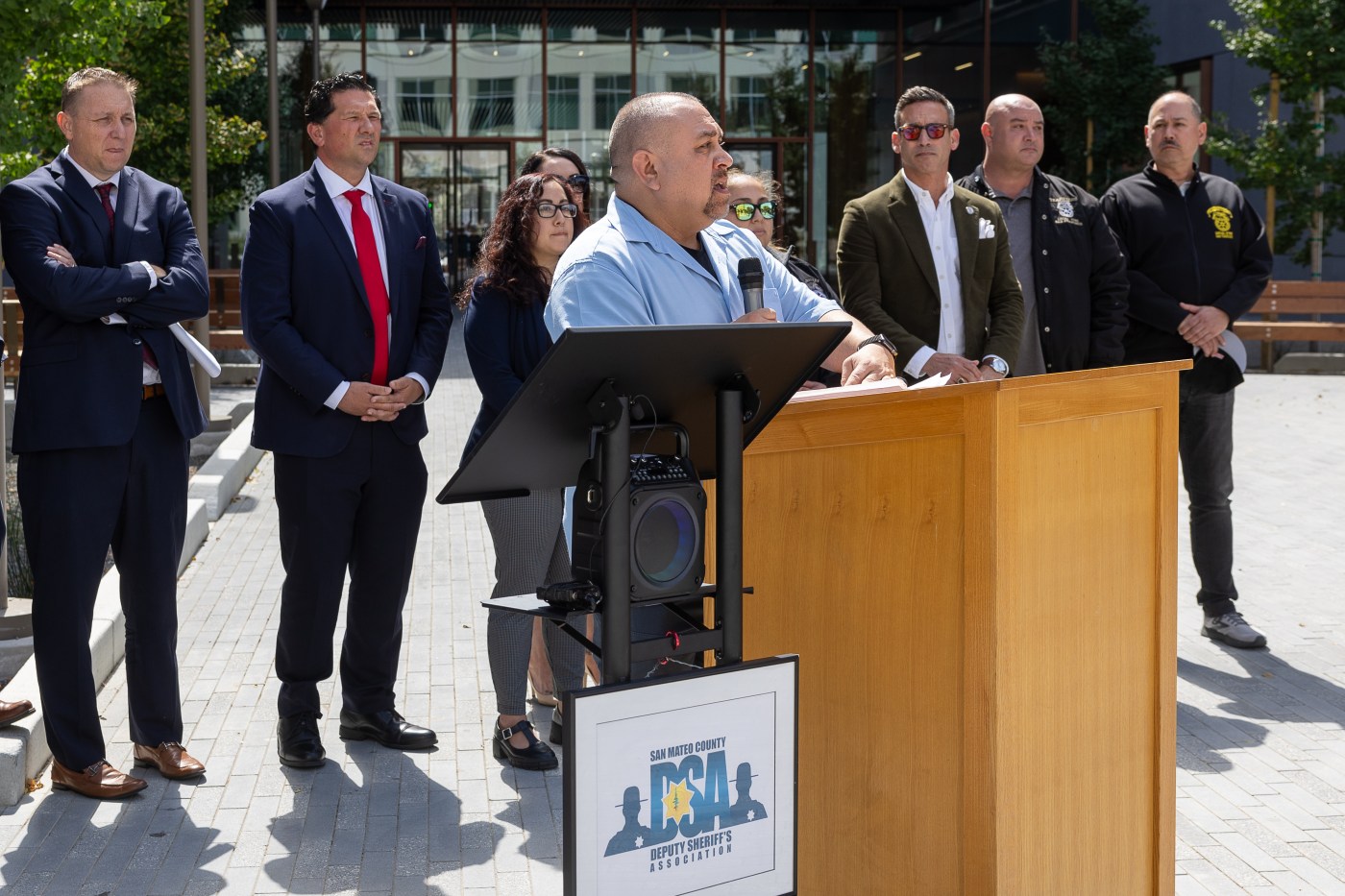
Union President Carlos Tapia took the witness stand Monday in what is expected to be San Mateo County’s final day to present its case against Sheriff Christina Corpus, who faces two simultaneous efforts to remove her from elected office.
Tapia, arrested in November 2024 on allegations of timecard fraud, testified extensively for the first time in public since his arrest. His testimony followed several days of scrutiny over his payroll records, which Corpus’ attorneys argue were part of a legitimate investigation, while the county characterizes it as retaliation against a vocal critic.
Tapia’s arrest happened on the same day the county released a scathing 400-page investigative report accusing Corpus of retaliation, workplace bullying, and efforts to secure a high salary for her former chief of staff, Victor Aenlle, despite questions about his qualifications. The report was authored by retired Santa Clara County Superior Court Judge LaDoris Cordell.
“When I found out she was running for sheriff in April 2022, I was happy for her, she was good to me,” Tapia said, testifying that he once supported the sheriff.
Related Articles
Week one of Sheriff Corpus removal hearing ends with timecards, politics and emotion
Former aides, colleagues testify against San Mateo County Sheriff Corpus in removal hearing
County paints picture of toxic leadership at second day of Sheriff Corpus removal hearing
San Mateo County Sheriff Corpus blames overtime dispute for county’s removal attempt
Why former Obama and Biden official joined legal defense team of Bay Area sheriff facing removal
But by January 2024, he said, he began receiving complaints about Aenlle, including concerns about him wearing a uniform despite being a civilian and carrying a firearm, among other issues.
Corpus, elected in 2022, has denied all accusations raised against her and refused to resign despite mounting political pressure. She also faces a separate removal process through a civil grand jury accusation that was filed in June.
The allegations prompted a special election in March, when voters granted the Board of Supervisors authority to remove an elected sheriff until 2028, the end of Corpus’ term. Measure A, which created this removal process, made San Mateo the first Bay Area county to give its board that authority.
If removed, Corpus would be the first elected sheriff in California to be ousted by a county Board of Supervisors.
While the county’s first witnesses last week focused on Corpus’ alleged inappropriate relationship with Aenlle, which she denies, testimony later in the week centered on the arrest of Tapia. The county is arguing that his arrest — made on probable cause — was one of the most extreme examples of retaliation against dissenting deputies.
On Monday morning, county attorneys sought to bar the defense from presenting a new theory that Tapia intentionally falsified his timecards, an issue previously investigated by the District Attorney’s Office, which declined to file charges last year, effectively clearing him of wrongdoing. Retired Judge James Emerson, who is overseeing the quasi-judicial proceedings, granted the motion.
During the period his timecards were audited, Tapia spent three days a week on Deputy Sheriff’s Association duties and one day in the transportation unit.
Deputy Chief District Attorney Shin-Mee Chang also testified Monday about Tapia’s arrest, saying she had advised against taking him into custody without a warrant. She said she warned then-Assistant Sheriff Matthew Fox that the investigation was complex and could not be wrapped up within the legal timeline for holding someone arrested without a warrant.
“He would be released within 48 hours since there was no way we’d be able to complete the investigation at the allotted time,” Chang said. “If we decided to file charges, we’d issue an arrest warrant. He posed no flight risk, there was also no public safety risk.”
Also on Monday, former Half Moon Bay Police Capt. Rebecca Albin testified that she was locked out of her work systems and email shortly after posting her resignation on the social media platform Nextdoor without clearing it with the sheriff. Corpus testified last week that she was concerned the announcement could harm the city’s relationship with her office.
Lt. Dan Reynolds, who was assigned to the department’s professional standards bureau overseeing internal investigations until this year, wrapped up his testimony Monday morning.
He criticized Corpus for maintaining a “skeletal” executive team and for micromanaging or moving too slowly on investigations, issues which were raised in the county-commissioned Keker report, a follow-up to the Cordell report, that was published earlier this year. Reynolds testified that over 30 internal affairs cases from the past year had not yet been acted upon.
“The message is that officers can commit the same acts again because there are no consequences,” Reynolds said.
Through its called witnesses, the county has argued that Corpus is a vindictive leader who retaliated against critics and blurred professional and personal boundaries. Her defense team counters that she is a reformer pushing back against entrenched sexism, corruption, and excessive overtime while managing budget and staffing challenges.
Once the county rests its case, Corpus’ legal team is expected to begin calling witnesses. On Tuesday and throughout the rest of the week, the removal hearing will start at 8:30 a.m., half an hour earlier than usual, as the proceedings have been running longer than expected.
Emerson will have 45 days after testimony concludes to issue a written advisory opinion to the Board of Supervisors on whether “cause” exists for Corpus’ removal. The board will then have 30 days to review the opinion and hold a public vote. Removal requires a four-fifths majority and would take effect immediately.
A final vote could come as late as November or December. If Corpus is removed, the board will have 30 days to either appoint a new sheriff or call a special election. If the board fails to act, the elections office must immediately schedule a special election to fill the vacancy.